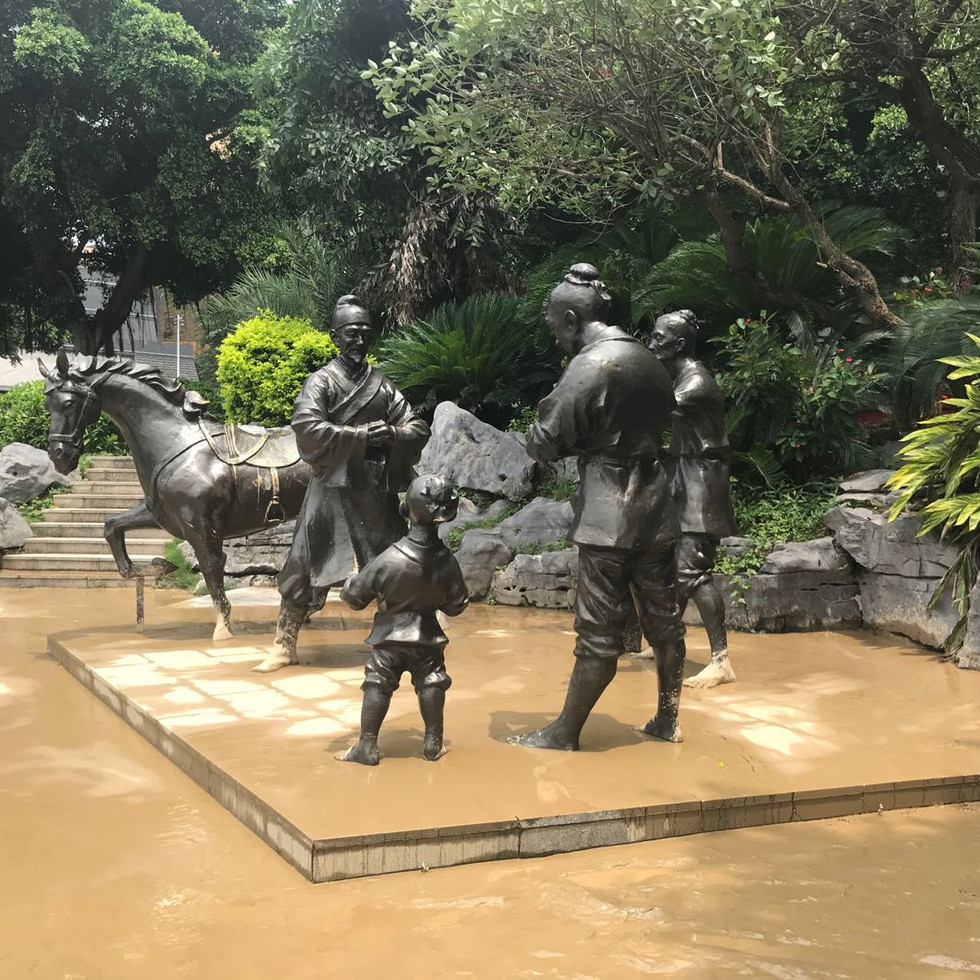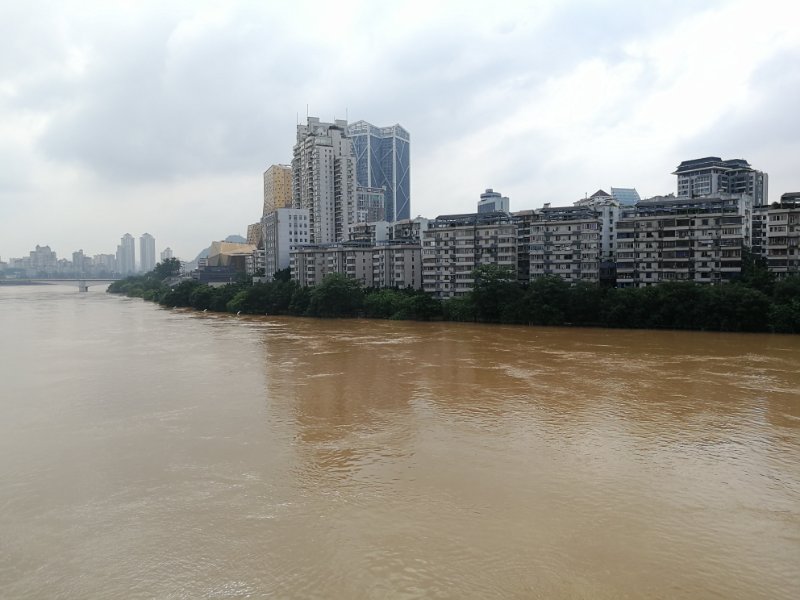柳州柳刺史,
種柳柳江邊。
談笑為故事,
推移成昔年。
垂陰當覆地,
聳幹會參天。
好作思人樹,
慚無惠化傳。[1]
Prefect Willow of the Willow County,
Is planting willows along the Willow River.
Joyful talks will become old stories,
Just as what is gone will be the years past.
The shade hung [by the willows] will cover the ground;
Their trunks that stand tall shall reach the sky.
[I] would love them to become the Tree of Remembrance,[2]
[Yet] embarrassingly, [I] don’t have a contribution worthy of transmission.
* From Liu Zongyuan shi jianshi 柳宗元詩箋釋, collated and annotated by Wang Guoan 王國安 (Shanghai: Shanghai guji chubanshe, 1993).
[1] Red characters rhyme.
[2] This alludes to the poem “Gantang” 甘棠 (Sweet Pear Tree) in the Shijing 詩經 (The Book of Songs), which urges people not do any harm to the tree with which the legendary minister Shaogong 召公 (Lord Shao) was associated. The tree is known as a sirenshu 思人樹, or “Tree of Remembrance” as it reminds the locals of the gracious governance of Shaobo. For a convenient reference to the poem: https://ctext.org/book-of-poetry/gan-tang.
Finally, we see a Liu Zongyuan that is not in distress. It is always a good idea to promenade along a river and perhaps bond with nature through some physical work such as planting trees. In fact, Liu Zongyuan wrote three poems on his planting activities in Liuzhou, one of which records that he planted two hundred Mandarin orange trees in the northwest of the city! Although these poems can’t really be described as “cheerful,” they do suggest Liu Zongyuan, fortunately, didn’t spend all his time being unhappy.
Liu Zongyuan’s jest is best represented by the first two lines about the coincidence that his surname liu 柳 (willow) is the same character as in the names of the county and the river. A more “serious” composition of regulated verse would avoid the repetition of any word, let alone repeating a word four times! Historical readers have suggested that these two lines derived from some words from Liu Zongyuan’s friend, or from some local ditties, but no one really knows their origins. After all, it is not such a difficult thing to link all these several “willows,” so there’s a chance that Liu Zongyuan came up with the idea himself.
While I’m relieved to see Liu Zongyuan not indulging in his frustration, the Qing dynasty poet Qu Fu 屈復 (1668-1745) insisted that this was a sad poem: “[T]he willow’s hanging shade and standing trunks are so incredibly lively, yet the poet’s life is limited. Although the title says ‘in jest,’ each and every word is a tear.”[3] Wang Guoan added his note right after Qu Fu’s sensitive interpretation: “This poem shows no sign of sadness. It truly is ‘written in jest.’”[4]
Perhaps Qu Fu himself wasn’t in a good mood when he read this poem, or maybe it just happened that he didn’t have the opportunity to experience the healing power of planting trees. However, I can’t really say that his words have come from nowhere. Liu Zongyuan does seem to be very conscious of time when he says things of today will become the past (lines 3-4) and continues to imagine the future of the newly planted willows (lines 5-6). In another poem, he writes about planting the muhu-flowers 木槲花 as if that was the only thing he could do in his long exile.[5] In the poem about planting Mandarin orange trees, he first asks when one would see the presumably splendid blossoms and who would be enjoying the fruits, as if he wouldn’t be there the next year. But then he continues to say something like, “Oh, it’s probably going to be myself who would see these trees grow into a grove and be fed by their fruits.”[6] I must say it is hard to believe that Liu Zongyuan at this point was genuinely hoping to stay in Liuzhou for long enough to enjoy the Mandarin oranges...
In short, considering Liu Zongyuan’s many bitter complaints about Liuzhou and the other two poems on his planting activities, I should perhaps adjust my initial thought on “Written in Jest on Planting Willows.” Indeed, the poem itself doesn’t show any melancholy, but it might not be as bright as it seems at first sight. It was perhaps just one of the few days when the poet felt better and was temporarily distracted from his frustration.
The last two lines showing Liu Zongyuan’s modesty are not stating the truth. In fact, Liu Zongyuan made a significant move to free many locals from slavery in Liuzhou, which has been documented and passed down until today. The Willow River nowadays, by the way, is flanked by trees, many of which are willows. I’m not sure whether there are any descendants of the ones planted by Liu Zongyuan, but they have certainly become the Tree of Remembrance for this city.
[3] Wang Guoan, Liu Zongyuan shi jianshi, 369: 柳之垂陰聳幹,生意無窮,而己之在世有限。題雖曰戲,而意則一字一淚。 [4] Ibid.: 詩未見有悲意,直是“戲題”也。
[5] Wang Guoan, Liu Zongyuan shi jianshi, 371: 祇應長作龍城守,剩種庭前木槲花. I couldn’t identify this plant. Some say orchids, but it could also be magnolia or something else.
[6] Wang Guoan, Liu Zongyuan shi jianshi, 364: 幾歲開花聞噴雪,何人摘實見垂珠?若教坐待成林日,滋味還堪養老夫。
PS: I wanted to take some nice photos of willows by the river, but we had a very stormy week. Last week, the statues along the riverside path already stood in mud. Now the riverbank is totally flooded. I’m afraid the willows are going to be in the bath for quite a while.
Copyright Declaration*:
The texts and images used on the website of Rachelle's Lab are either from the public domain (e.g. Wikipedia), databases with open data licences (e.g. Shuhua diancang ziliao jiansuo xitong 書畫典藏資料檢索系統, National Palace Museum, Taipei), online libraries that permit reasonable use (e.g. ctext.org), or original work created for this website.
Although fair use of the website for private non-profit purposes is permitted, please note that the website of Rachelle's Lab and its content (including but not limited to translations, blog posts, images, videos, etc.) are protected under international copyright law. If you want to republish, distribute, or make derivative work based on the website content, please contact me, the copyright owner, to get written permission first and make sure to link to the corresponding page when you use it.
版權聲明:
本站所使用的圖片,皆出自公有領域(如維基)、開放數據庫(如臺北故宮博物院書畫典藏資料檢索系統)、允許合理引用的在線圖書館(如中國哲學電子化計劃)及本人創作。本站允許對網站內容進行個人的、非營利性質的合理使用。但請注意,本站及其內容(包括但不限於翻譯、博文、圖像、視頻等)受國際版權法保護。如需基於博客內容進行出版、傳播、製作衍生作品等,請務必先徵求作者(本人)書面許可,并在使用時附上本站鏈接,註明出處。
*Read more about copyright and permission here.









コメント